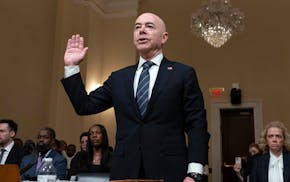Two days after he proposed significant changes to Minnesota's tax structure, Gov. Mark Dayton warned Thursday that he expects to be besieged for months by the people and businesses who would face new or higher taxes under his plan.
Even as his Revenue Department was releasing details of who would be pinched and who would be exempt, Dayton heard from executives who said his plan would kill jobs and businesses. The governor, who is proposing new taxes on wealthy Minnesotans and expanding the sales tax to business services, said he is willing to pursue his plan even if it hurts his re-election chances.
"If my shot fails, the next one will be taken by the voters in November of 2014," Dayton said. "I am also very mindful of what I got myself into. ... I wouldn't choose to be in this situation but I do choose to get us out of it."
With a plan to extend sales taxes to everything from clothing worth more than $100, to haircuts, to accounting services and to all the sales businesses make to one another, Dayton has entered into an epic fight that could define his career.
If he wins over Minnesotans and gets his way in the DFL-led Legislature, Dayton will have overcome powerful opposition that has felled nearly all past attempts at tax overhaul. If he fails in the face of a public that feels it is already overtaxed, Dayton will damage his legacy and give Republicans a new opening to retake the Legislature and the governor's office.
Dayton released his initial budget proposals Tuesday morning. The list of what's in and out of his sales tax plan was released late Thursday. Food, child care, burial services, fundraising sales, prescriptions, mining and agricultural equipment and textbooks would remain exempt from sales taxes.
Business groups have been quick to object to the plan, in particular to the fact that it would subject business-to-business sales to taxation. Many executives see that as creating a domino effect of higher costs that could cripple their businesses and force up prices on finished products.
'A business killer'
One executive described the expanded sales tax Wednesday as "a business killer." Charlie Weaver, executive director of the Minnesota Business Partnership, said that type of tax "pyramids into the cost of a product" and is hard to administer.
Dayton heard that criticism again Thursday from members of the Minnesota Newspaper Association. The executives complained that they would be taxed on their advertising, printing and paper before the newspaper ever reached readers.
"If you tax something, you get less of it," Tom West, general manager of the Morrison County Record, told Dayton. "We are the ones that cover local government and state government. ... How do you think it would be a good idea to have less information about government?"
As the crowd applauded, Dayton responded: "I don't think it is a good idea to tax anybody from that standpoint ... but what's a better alternative?"
Dayton said he expected his plan to be refined, but he made clear that any business claiming a special reason to be exempt from sales taxes -- as newspaper executives did Thursday -- will have a difficult time with him.
"For everything you take out ... you have to add more," he said.
The governor's embrace of an expanded sales tax goes counter to his 2010 campaign, when he argued for raising the income tax on high-earning Minnesotans but said he was not a fan of raising sales taxes. During the past two years, his opposition to that option dissipated.
Despite objections to some parts of Dayton's plan, Senate Majority Leader Tom Bakk said that legislators have been pretty supportive of it so far.
"Overall, I think it was very well received," said Bakk, DFL-Cook.
Sen. Terri Bonoff, a DFLer from Minnetonka, said she appreciated Dayton's desire to invest in the state and his proposed expansion of the sales tax to consumer services. But she said she would oppose his plan to increase the income tax on couples earning more than $250,000 and singles making more than $150,000 as well as his call for taxing business-to-business services.
"I cannot support that," Bonoff said.
'Olive branches'
Legislators are already discussing ways to make the governor's plan more acceptable to the business community. Bakk, for instance, is thinking about offering nonresidents of the state a break on the clothing sales tax.
That, he said, could help the Mall of America's tourism business and extend "an olive branch to the mall." Bakk said Canada offers a similar tax break to foreign visitors.
Dayton and his backers stressed that his proposal also would drop some taxes. He would lower sales taxes for all items that are currently taxed, reduce corporate and business property taxes and give all Minnesota homeowners a property tax rebate worth up to $500 a year.
He said the simplicity of a direct payment to property tax payers makes it appealing. A direct refund, he said, "goes a long way into terms of establishing trust that people have that you are going to do what you say."
Asked if he was trying to make his plan more palatable, he joked:
"It's already unpopular enough. I have to do something to help it out, right?"
Rachel E. Stassen-Berger • Twitter: @rachelsb
Start your day with our Morning Hot Dish political newsletter. Sign up at startribune.com/membercenter.
New Black congressional district in Louisiana bows to politics, not race, backers say
Trump trial jury selection process follows a familiar pattern with an unpredictable outcome
Climate change concerns grow, but few think Biden's climate law will help, AP-NORC poll finds
